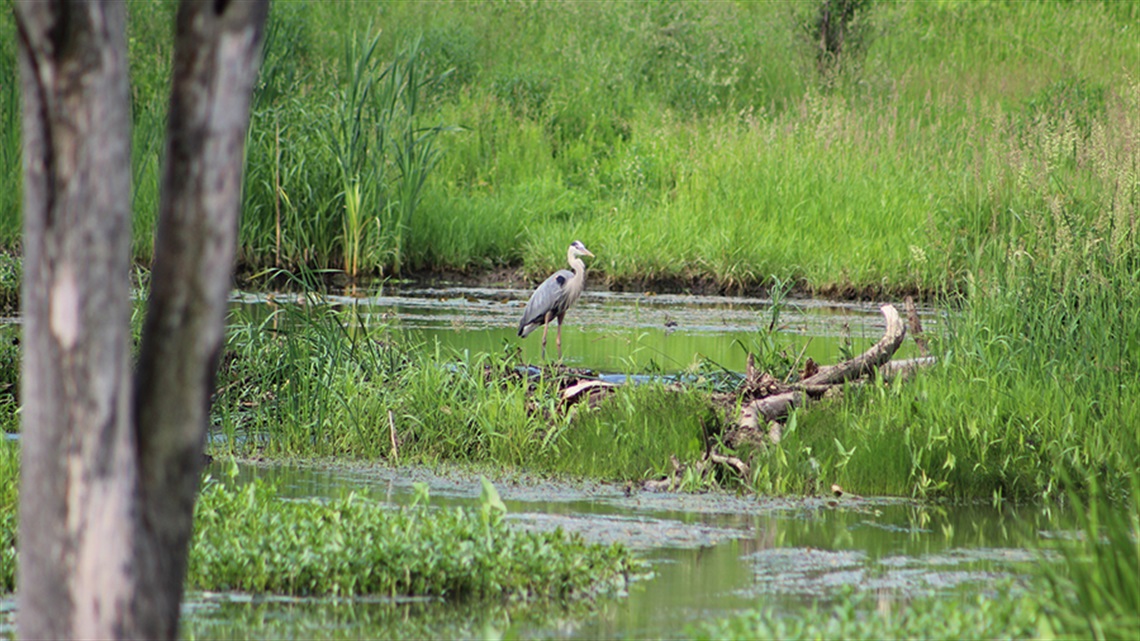Volunteer research shows Lake Lenexa is fulfilling its purpose
Published on December 06, 2024

Lake Lenexa and surrounding Black Hoof Park are designed to blend excellent park amenities and beautiful natural areas. A recent study by a group of citizen scientists suggests that the lake is succeeding in another key role: improving water quality.
About the project
The Lake Lenexa project is one of the most well-known achievements of the City of Lenexa’s innovative Rain to Recreation program, which creates recreational opportunities that protect water and reduce flooding. The project was designed to improve regional water quality by capturing stormwater in wetlands. These wetlands remove sediment and associated pollutants, sequester nutrients, provide flood control and preserve critical habitat. One wetland was built in the southern part of Lake Lenexa, where Coon Creek enters the lake. Two more wetlands were built further upstream in the Coon Creek watershed.
In 2023, the “Stream Team,” a subset of the Johnson County Extension Master Naturalists program focused on water quality initiatives, began regularly monitoring the Coon Creek Watershed and Lake Lenexa. The goals of this volunteer team were to assess the effectiveness of the lake/wetland complex in improving regional water quality and educate the public about local water quality issues. The Stream Team collected water quality data from Coon Creek both upstream (the part of the stream flowing into the lake) and downstream (the stream flowing out of the lake).
Initial findings
The Stream Team recently shared their first collection of findings with the City of Lenexa. Several key measurements indicate that the wetlands are effectively cleaning the lake. The evidence also suggests that communitywide education efforts to improve water quality — like encouraging the reduction of fertilizer usage — are having an impact, too.
“We found that nutrient levels in the streams and lake are consistently low, below water quality criterion standards,” a statement from the Stream Team said. “Low nutrient levels suggest that upstream wetlands constructed under Lenexa’s Rain to Recreation Program are improving water quality in the watershed and that the surrounding communities are minimizing nutrient pollution runoff from fertilized lawns and gardens.”
“Our comparison of the inflowing and outflowing streams provides evidence that the lake/wetland complex is functioning to clean the Coon Creek Watershed in two important ways,” the statement continues. “First, we have found that after large rain events, water in the outflowing stream is clearer (less murky) compared to the inflowing stream. Second, total dissolved solids are lower by about 50% in the outflowing stream compared to water entering the lake and wetland.”
Lake Lenexa and Coon Creek Water Quality Data(PDF, 260KB)
What does this tell us about water quality?
Murky water is caused by solids suspended in streams by erosion. Solids block sunlight, making it difficult for plants and algae to grow. They also degrade the appearance of water.
Dissolved solids include minerals and salts, like those used for deicing. They’re indicators of general stream quality. High concentrations are harmful to many forms of aquatic life.
“We conclude that Lake Lenexa and its associated wetlands are providing an important service by cleaning streams in the Coon Creek Watershed,” the Stream Team reported.
The Stream Team plans to keep monitoring Lake Lenexa to track the effects of surrounding development on water quality. Visit their website to view future data: Water Quality (k-state.edu)
About Master Naturalists and the Stream Team
Johnson County Extension Master Naturalists is an educational, nonprofit organization provided through Kansas State University Research and Extension. Master Naturalists are volunteers who share their time and expertise. They are collectors of scientific data, interpreters, teachers advocates and stewards with the goal of enhancing our natural resources. The Stream Team is a Master Naturalist program in which volunteers monitor, maintain and restore natural conditions in Johnson County streams while providing education and outreach to the public.